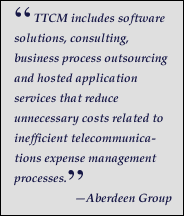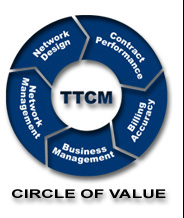




TTCM Savings Area:
Contract Performance
Published In: Volume
2 Issue 2
Date: June,
2003
|
Recently we worked with a client who needed to evaluate why a large volume of calls were being billed at a rate other than the expected "domestic voice" rate they had contracted for. Our plan to clear this up was straightforward. First we broke down their contract into each of its separate billing categories - there were over 40 of them! Next we used our proprietary software to extract the data from their billing CDs and recompile it, placing each call into the appropriate billing category. Finally we evaluated the charges associated with those calls against the pricing provided for in the contract. Sure enough, a large number of calls were being charged significantly higher rates than the contract indicated. They were domestic calls, and they were voice, but they weren't "domestic voice". A careful reading of the published rate schedules referenced in the contract revealed a fine-print clause which excluded Intralata calls from the "domestic voice" category. Unfortunately, this client's call pattern required a large number of those calls and therefore a large amount of extra expense. These types of language gaps are a common pitfall in telecom contract terms and MUST be identified and clarified before signing any deal. But they aren't the only reason that knowing your contract inside and out is critical. As with most contracts, what you pay, and what you pay for, are based on the combination of price and terms. As the previous story shows, it's the terms that can eat you up just as much as the pricing. Obviously, entering into a long-term telecom contract should never be taken lightly. One missed detail can cost a company thousands in increased charges. Here are a few more areas in your terms section that are well worth mastering. And please do not hesitate to call us if you have any questions. TelAssess experts have been involved in literally billions of dollars worth of contract value projects. We have the expertise to insure your next contract is the most favorable one possible.
As your telecom contracts get larger, the risks get higher. TelAssess encourages its clients to have a clear understanding of everything in their contracts because these are the rules you'll have to live by throughout the term of the agreement.
TelAssess offers contract optimization and negotiation services, which can significantly improve the terms and prices for your telecom services. Our experts have been involved in negotiations totaling billions of dollars in contract value. To learn more, please visit the Contract Optimization section of our website or call us today at 800-657-1595.
©2004,
TelAssess, Inc. All rights reserved. |
![]()
©2004, TelAssess 800.657.1595
Designed by Stylus
Designs

